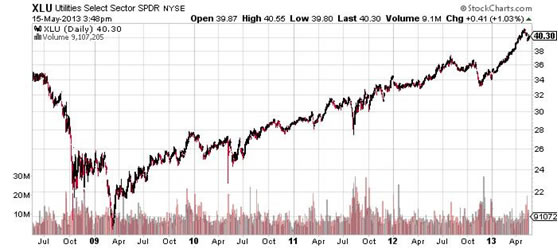U.S. Economy Getting Better; Should You Jump into Cyclical Stocks?
Companies / Investing 2013 May 20, 2013 - 06:09 PM GMTBy: DailyGainsLetter
Moe Zulfiqar writes: As the risks in the stock market increase, investors most often run towards defensive stocks. The main reason behind this phenomenon is that companies that are considered defensive provide investors with a stream of dividends, even when the markets, as a whole, crumble. They are generally strong players in their industry, with healthy market shares and stable earnings year-over-year.
The stock market rally, which began in March 2009, was born on a significant amount of pessimism. At the time, when the key stock indices like the S&P 500 bottomed, there were still concerns about whether the financial system was able to get back on its feet, or if the U.S. economy could avoid a depression: unemployment was staggering, consumer spending was crushed, and businesses were struggling to sell and earn profit.
This resulted in investors rushing towards defensive stocks. Below is the chart of the Utilities Select Sector SPDR (NYSEArca/XLU) exchange-traded fund (ETF). This is just a one example of where investors rushed to.

Chart courtesy of www.StockCharts.com
The utilities sector is considered to be defensive because the companies in the sector sell what people usually need. In times of economic slowdown, they might just decrease the amount of a certain product used, but can’t really stop using it; for example, electricity providers are considered to be defensive stocks in the utilities sector.
Moving forward to now, the reasons investors rushed into defensive stocks are running out. The U.S. economy is getting better—or at the very least, there is some progress that suggests it is moving towards economic growth. Why? Unemployment is much lower, the housing market is slowly recovering, banks are earning profit, and businesses as a whole are in better conditions.
So this leaves us with one question: is it time to bail out on defensive plays and move towards cyclical stocks? Cyclical stocks are companies that perform depending on the economic environment, meaning they do well as the economy gets better and perform poorly as the economy deteriorates.
This may sound like a good investment strategy, but despite all the improvements in the U.S. economy, there are still problems. Instead of completely ditching the defensive stocks—remember: they provide dividends and have a constant earnings growth rate—investors may want to get some exposure in the sectors that are cyclical.
The reasoning behind this is that if we assume the U.S. economy is on its way towards economic growth, cyclical stocks, as mentioned earlier, perform in line with the economic conditions. Therefore, they will provide better returns to investors compared to the defensive stocks. Keep in mind that this by no means suggests defensive stocks are useless and investors should sell them.
One cyclical ETF investors may want to explore is PowerShares Dynamic Leisure & Entertain (NYSEArca/PEJ). This ETF invests in companies that are involved in leisure and entertainment. (Source: “PowerShares Dynamic Leisure & Entertain (PEJ),” Yahoo! Finance, last accessed May 15, 2013.) The idea behind this is that if the economy is getting better and businesses are performing well, then they will hire more people. As a result, people will have jobs, leading to more disposable income, and therefore, more spending on the things they want.
Source: http://www.dailygainsletter.com/stock-market/u-s-economy...
Copyright © 2013 Daily Gains Letter – All Rights Reserved
Bio: The Daily Gains Letter provides independent and unbiased research. Our goal at the Daily Gains Letter is to provide our readership with personal wealth guidance, money management and investment strategies to help our readers make more money from their investments.
© 2005-2022 http://www.MarketOracle.co.uk - The Market Oracle is a FREE Daily Financial Markets Analysis & Forecasting online publication.



